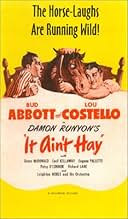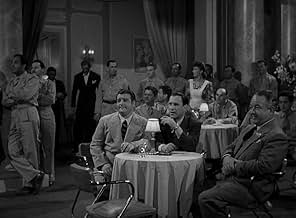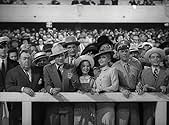AVALIAÇÃO DA IMDb
6,5/10
1,1 mil
SUA AVALIAÇÃO
Adicionar um enredo no seu idiomaThe horse of a street vendor is replaced by a racehorse.The horse of a street vendor is replaced by a racehorse.The horse of a street vendor is replaced by a racehorse.
- Direção
- Roteiristas
- Artistas
- Prêmios
- 1 indicação no total
The Four Step Brothers
- The Step-Brothers
- (as The Four Step-Brothers)
Charles Bennett
- SPCA Driver
- (não creditado)
- Direção
- Roteiristas
- Elenco e equipe completos
- Produção, bilheteria e muito mais no IMDbPro
Avaliações em destaque
IT AIN'T HAY (Universal, 1943), directed by Erle C. Kenton, stars the popular comedy team of Bud Abbott and Lou Costello in a horse racing story based on "Princess O'Hara" by Damon Runyon. Previously filmed as PRINCESS O'HARA by Universal (1935) starring Jean Parker and Chester Morris, this 1943 edition is a very loose adaptation to the Runyon tale, being more emphasis on Abbott and Costello than the title character of Princess O'Hara, here played by an appealing youngster by the name of Patsy O'Connor.
The plot development introduces Princess Peggy O'Hara (Patsy O'Connor) as a carriage driver of New York City giving a ride to Private Joe Collins (Leonard Noble) and his girl, Kitty McGloin (Grace MacDonald) as they go through Central Park. Peggy and her father, King O'Hara (Cecil Kellaway) are best friends with Wilbur Hoolihan (Lou Costello), a taxi driver, and his shiftless partner, Grover Mockridge (Bud Abbott). After Wilbur gives their horse, Finnigan, some of his peppermint candy, the horse becomes sick, with Wilbur being the only one who can cure him with a giant horse pill. Sadly, the horse dies, leaving Grover and Wilbur to make amends by earning enough money to buy the Princess a new horse. With one thing leading to another, such as unwittingly buying a police horse, three gamblers, Umbrella Sam (Shemp Howard), a "Damon Runyon" character, Harry the Horse (Eddie Quillan) and Chauncey the Eye (David Hacker), the dual go to the upstate stables of Empire Track to acquire a free horse. Instead, Grover and Wilbur end up getting Tea Buscuit, the world's famous racehorse belonging to Colonel Brainard (Samuel S. Hinds), who offers $10,000 reward for its return. Realizing what they have done, and learning that King O'Hara has taken both horse and carriage to Saratoga with the stolen horse, Wilbur, along with Kitty, Joe and Wilbur, drive his taxi to Saratoga, followed by the three gamblers out for the reward, and encounter a tough efficiency expert, Gregory Warner (Eugene Palette), now hotel manager, whom they have encountered earlier on several occasions, to add to their troubles.
As in many Abbott and Costello comedies up to this point, production numbers are added for entertainment value, including those scored by Harry Revel and Paul Francis Webster: "The Sunday Serenade" and "Old Timer" (both sung by Patsy O'Connor); "Glory Be" (introduced by Grace MacDonald, sung by others, including The Vagabonds, followed by specialty skating acts by The Hollywood Blondes and tap dancing routines by The Step Brothers); "Let's Smile With Music" and "Hang Your Troubles on a Rainbow" (both sung by Leonard Noble). While Noble's character, Joe, talks about doing an Army show throughout the story, it's obvious what was intended for a grand finale became nothing more than a brief montage of deleted song numbers with more attention focused on Abbott and Costello with Eugene Palette.
An exceptional comedy with assortment of old and new Abbott and Costello gags and chase sequences, for being a horse racing story, it would be natural for them to include their famous "fodder and mutter" routine into the story. With Abbott and Costello being the sole attractions, Eugene Palette, the heavy man with the froggy voice, comes close in stealing every scene he's in. In fact, he's practically a running gag throughout the story, being everywhere involving the boys, including the cafeteria (look fast for Mike Mazurki as one of the burly bouncers), Colonel Brainard's stable, the Oaks Hotel in Saratoga, the race track and finally their confrontation at the musical show. Palette is certainly one person in this story who makes IT AIN'T HAY a viewing pleasure. The Sportsman's Club involving Big-Hearted Charlie (Andrew Toombes) and the double-dealing Slicker (Richard Lane) also ranks one of the funnier scenes in the story. There are a couple of sequences that come as a reminder of scenes lifted from earlier Marx Brothers comedies of both DUCK SOUP (Paramount, 1933) and A DAY AT THE RACES (MGM, 1937). Watch for it.
While Costello shows how he can excel in sentiment moments involving the death of the horse without making it hard to sit through, the only downside comes when a kid calls Wilbur a murderer. His acting is so bad and hard to sit through (though fortunately brief), it's a wonder how it passed through in the final print, unless this kid happened to be related to someone in the production staff. Getting past this uneasy moment, the rest of this 80 minute feature is smooth racing right down to the finish line.
Although IT AIN'T HAY enjoyed frequent television revivals throughout much of the 1970s and 80s, it was reportedly taken out of circulation due to legal complications involving the Damon Runyon estate, keeping the movie from ever being issued on video cassette or DVD. By 2008, the rights were resolved and IT AIN'T HAY has become available on DVD in all its glory. For Abbott and Costello, or even Eugene Palette fans, IT AIN'T HAY is well worth the gamble. (***)
The plot development introduces Princess Peggy O'Hara (Patsy O'Connor) as a carriage driver of New York City giving a ride to Private Joe Collins (Leonard Noble) and his girl, Kitty McGloin (Grace MacDonald) as they go through Central Park. Peggy and her father, King O'Hara (Cecil Kellaway) are best friends with Wilbur Hoolihan (Lou Costello), a taxi driver, and his shiftless partner, Grover Mockridge (Bud Abbott). After Wilbur gives their horse, Finnigan, some of his peppermint candy, the horse becomes sick, with Wilbur being the only one who can cure him with a giant horse pill. Sadly, the horse dies, leaving Grover and Wilbur to make amends by earning enough money to buy the Princess a new horse. With one thing leading to another, such as unwittingly buying a police horse, three gamblers, Umbrella Sam (Shemp Howard), a "Damon Runyon" character, Harry the Horse (Eddie Quillan) and Chauncey the Eye (David Hacker), the dual go to the upstate stables of Empire Track to acquire a free horse. Instead, Grover and Wilbur end up getting Tea Buscuit, the world's famous racehorse belonging to Colonel Brainard (Samuel S. Hinds), who offers $10,000 reward for its return. Realizing what they have done, and learning that King O'Hara has taken both horse and carriage to Saratoga with the stolen horse, Wilbur, along with Kitty, Joe and Wilbur, drive his taxi to Saratoga, followed by the three gamblers out for the reward, and encounter a tough efficiency expert, Gregory Warner (Eugene Palette), now hotel manager, whom they have encountered earlier on several occasions, to add to their troubles.
As in many Abbott and Costello comedies up to this point, production numbers are added for entertainment value, including those scored by Harry Revel and Paul Francis Webster: "The Sunday Serenade" and "Old Timer" (both sung by Patsy O'Connor); "Glory Be" (introduced by Grace MacDonald, sung by others, including The Vagabonds, followed by specialty skating acts by The Hollywood Blondes and tap dancing routines by The Step Brothers); "Let's Smile With Music" and "Hang Your Troubles on a Rainbow" (both sung by Leonard Noble). While Noble's character, Joe, talks about doing an Army show throughout the story, it's obvious what was intended for a grand finale became nothing more than a brief montage of deleted song numbers with more attention focused on Abbott and Costello with Eugene Palette.
An exceptional comedy with assortment of old and new Abbott and Costello gags and chase sequences, for being a horse racing story, it would be natural for them to include their famous "fodder and mutter" routine into the story. With Abbott and Costello being the sole attractions, Eugene Palette, the heavy man with the froggy voice, comes close in stealing every scene he's in. In fact, he's practically a running gag throughout the story, being everywhere involving the boys, including the cafeteria (look fast for Mike Mazurki as one of the burly bouncers), Colonel Brainard's stable, the Oaks Hotel in Saratoga, the race track and finally their confrontation at the musical show. Palette is certainly one person in this story who makes IT AIN'T HAY a viewing pleasure. The Sportsman's Club involving Big-Hearted Charlie (Andrew Toombes) and the double-dealing Slicker (Richard Lane) also ranks one of the funnier scenes in the story. There are a couple of sequences that come as a reminder of scenes lifted from earlier Marx Brothers comedies of both DUCK SOUP (Paramount, 1933) and A DAY AT THE RACES (MGM, 1937). Watch for it.
While Costello shows how he can excel in sentiment moments involving the death of the horse without making it hard to sit through, the only downside comes when a kid calls Wilbur a murderer. His acting is so bad and hard to sit through (though fortunately brief), it's a wonder how it passed through in the final print, unless this kid happened to be related to someone in the production staff. Getting past this uneasy moment, the rest of this 80 minute feature is smooth racing right down to the finish line.
Although IT AIN'T HAY enjoyed frequent television revivals throughout much of the 1970s and 80s, it was reportedly taken out of circulation due to legal complications involving the Damon Runyon estate, keeping the movie from ever being issued on video cassette or DVD. By 2008, the rights were resolved and IT AIN'T HAY has become available on DVD in all its glory. For Abbott and Costello, or even Eugene Palette fans, IT AIN'T HAY is well worth the gamble. (***)
Abbott and Costello are at their very best in this agreeable comedy. They play a couple of Manhattan taxi drivers with a fondness for a sweet young girl and her horse. Costello means well in trying to be nice to the animal, but his feeding it candy ultimately causes the horse to get sick - and die. So he and Abbott set out to make things right by getting a new horse for the girl, whose dad (Cecil Kellaway) runs a horse and carriage ride in the city. I know that synopsis sounds rather dramatic, but there is a lot of well-staged comedy between the serious moments. And Bud and Lou are as sharp in ever performing them. Some routines include: their classic "the horse eats his fodder", the boys getting swindled at a phony horse race outfit, Lou getting into trouble at a restaurant for not being able to pay his check, and other assorted gags. Third Stooge Shemp Howard also has a part, but the real fun comes courtesy of fat man Eugene Palette, who is the perfect foil for Costello's antics. As with almost all of A&C's movie of this period, there is some singing and dance numbers here; however, I find them to be rather entertaining and endurable this time out. *** out of ****
Universal kept Abbott&Costello very busy during the World War II years. They made so many films one wonders when they had time to do personal tours and war bond rallies. One of the more unusual items the team made was It Ain't Hay which was taken from one of Damon Runyon's Broadway stories. You'll recognize some of the character names from Guys And Dolls.
Lou Costello accidentally kills Cecil Kellaway's horse. Kellaway drives a horse drawn cart in Central Park and Lou's guilt, plus the guilt laid on him by everyone else including Bud in a great scene, makes him buy a horse that some racing stable was selling.
Problems arise when Bud and Lou discover they have the wrong horse, the horse they were to buy was a dead ringer for the champion 'Teabiscuit'. The boys pick up the real Teabiscuit, but when they discover the mistake are determined to cash in on it.
The movie is plainly ripped off from the Marx Brothers A Day At The Races, but that doesn't prevent it from being funny. One definite weakness was that the musical score in the Marx film was a lot better than what Harry Revel and Paul Francis Webster wrote for It Ain't Hay. Still Leighton Noble and Grace McDonald handle the music end nicely and it doesn't get in the way of A&C's routines. And Eugene Palette as the villain gets a few laughs himself as he always does.
It Ain't Hay is not often shown and that's a pity. Catch it if possible and hope it comes out on both VHS and DVD.
Lou Costello accidentally kills Cecil Kellaway's horse. Kellaway drives a horse drawn cart in Central Park and Lou's guilt, plus the guilt laid on him by everyone else including Bud in a great scene, makes him buy a horse that some racing stable was selling.
Problems arise when Bud and Lou discover they have the wrong horse, the horse they were to buy was a dead ringer for the champion 'Teabiscuit'. The boys pick up the real Teabiscuit, but when they discover the mistake are determined to cash in on it.
The movie is plainly ripped off from the Marx Brothers A Day At The Races, but that doesn't prevent it from being funny. One definite weakness was that the musical score in the Marx film was a lot better than what Harry Revel and Paul Francis Webster wrote for It Ain't Hay. Still Leighton Noble and Grace McDonald handle the music end nicely and it doesn't get in the way of A&C's routines. And Eugene Palette as the villain gets a few laughs himself as he always does.
It Ain't Hay is not often shown and that's a pity. Catch it if possible and hope it comes out on both VHS and DVD.
I spent years and years searching for IT AIN'T HAY, as it was the only A&C film missing from my collection. I finally got it this past Christmas. It isn't one of their better films, but it's still Abbott and Costello, and very enjoyable. There are several songs toward the beginning of the film, but by the second half they tone down quite a bit, which helps the film big time. This film also features among the best versions of the "Mudder; Fodder" routine. Costello is particularly funny in this one, and also has a couple of moments where he shows what a great dramatic actor he could be. Like I said, it isn't BUCK PRIVATES or MEET FRANKENSTEIN, but it's still good old Bud and Lou doing what they do best, and that's good enough for any true fan.
Abbott & Costello take on Damon Runyan although, apart from three dodgy racetrack bettors, there's little of the writer's trademark quirky characters to hand. There are no stand-out routines to speak of, but a couple of decent gags, and Eugene Pallette is always good for a laugh.
Você sabia?
- CuriosidadesConsidered by Bud Abbott and Lou Costello fans to be their "lost" film, it was never actually lost but was unavailable for viewing for many years due to legal issues with the Damon Runyon estate. The film was televised decades ago (presumably before the legal issues arose) but was never released on video, and was not included in MCA/Universal's original DVD sets of Abbott and Costello films that came out in 2004. In 2008 the rights issues were cleared and it was included in the DVD release "Abbott and Costello: The Complete Universal Pictures Collection."
- Erros de gravaçãoWhen Grover places his $100 bet, he places it on Seabiscuit's entered number. However, the horse with that number didn't win, so the ticket is worthless. Never mind that Seabiscuit won the race; bets at the track are on numbers, not on names.
- Citações
Grover Mockridge: Go answer the door. It might be Warner.
Wilbur Hoolihan: It won't do no good. We're all signed up with Universal.
- ConexõesReferenced in Eles e Elas (1955)
Principais escolhas
Faça login para avaliar e ver a lista de recomendações personalizadas
- How long is It Ain't Hay?Fornecido pela Alexa
Detalhes
- Data de lançamento
- País de origem
- Idioma
- Também conhecido como
- It Ain't Hay
- Locações de filme
- Empresa de produção
- Consulte mais créditos da empresa na IMDbPro
- Tempo de duração1 hora 20 minutos
- Cor
- Proporção
- 1.37 : 1
Contribua para esta página
Sugerir uma alteração ou adicionar conteúdo ausente

Principal brecha
By what name was Alta Malandragem (1943) officially released in India in English?
Responda



































